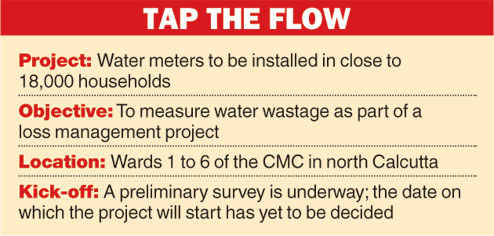
Feb. 22: Water meters are to be installed in houses across six wards of north Calcutta - not to make residents pay for what they use but to get a measure of how much water is wasted every day.
Installing water meters in wards 1 to 6 is part of a water-loss management project by the Calcutta Municipal Corporation (CMC) after repeated reminders from the Asian Development Bank (ADB), the civic body's main external funding agency.
The treated water that reaches households across Calcutta is supplied through a network of pipelines without any mechanism to check wastage. Since roadside points do not have valves, most of the treated water flowing out of the pipes goes waste.
According to estimates by the ADB and the World Bank, about 40 per cent of the treated water is wasted every day. Engineers in the civic body said up to 15 per cent wastage was "acceptable" going by international standards.
But since there is no mechanism yet to get an accurate measure of the water that is wasted, any such figure is contentious.
The water meters that the CMC intends to install are meant to measure how much water residents of wards 1 to 6 consume. That volume would be subtracted from the supply figure to get a measure of the wastage that happens each day.
The project to calculate water wastage is being funded mostly by the ADB. "We will divide the six wards into 25 zones. Meters will be fitted at the points where water enters each zone and also at the points where water flows out," said an engineer involved in the project.
"We will know how much water the households consume by reading the water meters. If there is no wastage, deducting the household consumption from the inflow will reveal the outflow. If it is found that the outflow is less, we will know how much water goes waste in a zone."
A novel feature of the Rs 213-crore project is the penalty-and-incentive provision for the private contractor selected to install the meters, do household surveys, calculate the total wastage and suggest and implement remedies.
SUEZ India, a subsidiary of Paris-headquartered SUEZ Environnement that specialises in water and waste management, has bagged the contract. Suez India is also working on a water management project for the Delhi Jal Board, an official of the company said.
If the company manages to reduce wastage to 15 per cent of production over the six-year project period, it will get a fixed amount. If it manages to keep wastage below 15 per cent, it will get an incentive. There will be a penalty for failure to reduce wastage by the minimum agreed percentage.
The ADB has been recommending levying a water tax on households based on usage to check wastage, but the Mamata Banerjee government is opposed to the idea.
In Calcutta, only about 400 buildings, mostly institutions and large apartments, have water meters and pay tax based on consumption. The project to measure wastage is the first instance of the civic body planning to install meters in homes, although there is no immediate plan of levying a water tax.
The Trinamul Congress's Subrata Mukherjee, who was the mayor of Calcutta between 2000 and 2005, had wanted to introduce water tax because he felt it would reduce wastage. He did not get permission to do so.
Bikash Ranjan Bhattacharyya of the CPM, who was the mayor between 2005 and 2010, did not go ahead with the proposal either.
"Anything that is free is wasted. If water has to be paid for, people will use it carefully. We do not forget to switch off the AC while leaving a room because we know we have to pay for electricity," said an official of the CMC.











